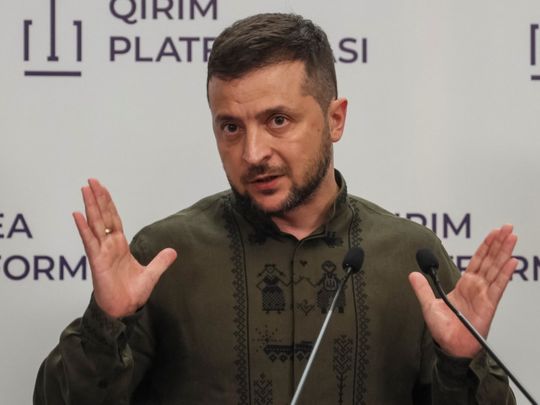
KYIV: Ukraine was “reborn” when Russia launched attacks six months ago, President Volodymyr Zelensky said on Wednesday, marking 31 years of his country’s independence from the Moscow-controlled Soviet Union with a vow to drive Russian forces out completely.
After days of warnings that Moscow could use the anniversary of Ukraine’s Independence Day to launch more missile attacks on major cities, Kyiv was unusually quiet and the second biggest city Kharkiv was under curfew after months of bombardment.
The anniversary fell exactly six months after Russia sent tens of thousands of troops into Ukraine.
In an emotional speech to his compatriots, Zelensky said the attack had revived the nation’s spirit.
“A new nation appeared in the world on February 24 at 4 in the morning. It was not born, but reborn. A nation that did not cry, scream or take fright. One that did not flee. Did not give up. And did not forget,” he said.
The 44-year-old leader, speaking in front of Kyiv’s central monument to independence in his trademark combat fatigues, vowed to recapture occupied areas of eastern Ukraine as well as the Crimean peninsula, which was annexed by Russia in 2014.
“What for us is the end of the war? We used to say: peace.
Now we say: victory,” he said, days after his government laid out the hulks of burnt-out Russian tanks and armoured vehicles in central Kyiv in a show of defiance.
Russia’s war effort in Ukraine has made little progress in recent months, after its troops were pushed back from Kyiv in the early weeks of the war.
Russian Defence Minister Sergei Shoigu told a meeting of defence ministers in Uzbekistan that Russia had deliberately slowed down what it refers to as its “special military operation” in Ukraine to avoid civilian casualties.
Ukraine broke free of the Soviet Union in August 1991 after a failed putsch in Moscow, and an overwhelming majority of Ukrainians voted in a referendum to declare independence.
‘INTENSIVE’ TALKS ON PLANT
International Atomic Energy Agency chief Rafael Grossi said the UN nuclear watchdog hoped to gain access to the Russian-occupied Zaporizhzhia nuclear power plant in southern Ukraine within days if negotiations succeed.
Both sides have accused the other of firing missiles and artillery dangerously close to the plant, Europe’s biggest, raising fears of a nuclear catastrophe.
Pro-Moscow forces took over the plant soon after the attacks started but Ukrainian technicians are still operating it.
The United Nations has called for the area to be demilitarised.
Russia accused Ukraine on Tuesday of attacking the plant with artillery, guided munitions and a drone, drawing a denial from Kyiv’s UN ambassador, Sergiy Kyslytsya.
“Nobody who is at least conscious can imagine that Ukraine would target a nuclear power plant at tremendous risk of nuclear catastrophe and on its own territory,” Kyslytsya told an emergency UN Security Council meeting in New York called by Russia.
While Ukraine has conducted mobilisation and declared a goal to form a 1 million-member military, Russia has continued to rely on a limited contingent of volunteers. an approach reflecting Kremlin fears that a mass mobilisation could fuel discontent and destabilise the country.
Moscow has opted for interim steps, trying to encourage people to sign contracts with the military, increasingly engaging private contractors such as the Wagner Group, and even rounding up some prisoners for service — half-measures unable to meet the needs for any big offensives.
“Unless Russia mobilises its population and mobilises its industry, it cannot bring to bear the weight of people and industry in order to create a much bigger, more effective force, and therefore, it will have to consider how it hangs on to what it has already taken,’’ retired British Gen. Richard Barrons said.
Ukraine also lacks resources for any quick reclamation of its territory, with Barrons estimating it could take well into next year to amass a force capable of driving the Russians out.
“It can only do it if the West provides political will, money at about $5 to 6 billion a month, weapons like long-range artillery, the ammunition that supports that artillery and then enables the logistics and medical support that allows Ukraine to build a million-strong army,’’ said Barrons, co-chair of the consulting group Universal Defence & Security Solutions.
He said the West should be prepared to continue supporting Ukraine for a long time, despite soaring energy prices and other economic challenges stemming from sanctions imposed on Russia.
Ukraine’s allies offered more military support on Wednesday.
Norway said it and Britain would jointly supply micro drones to help with reconnaissance and target identification.
The United States, which has sent $10.6 billion in security assistance to Ukraine, will announce a new package of about $3 billion as early as Wednesday, a US official said.
Advanced US missile systems appear to have helped Ukraine strike deep behind the front lines in recent months, taking out ammunition dumps and command posts.
In the latest mysterious fire at a Russian military facility, Russian officials said ammunition stored in southern Russia near the border with Ukraine spontaneously combusted on Tuesday.
Vyacheslav Gladkov, the governor of Belgorod region, blamed hot weather for the fire, drawing ridicule from Ukraine.
“In a few months we will find out whether Russian ammunition can explode because of the cold,” Ukraine’s defence ministry said on Twitter.
“The five main causes of sudden explosions in Russia are: winter, spring, summer, autumn and smoking.”












